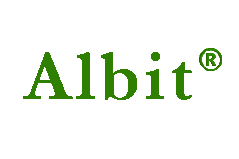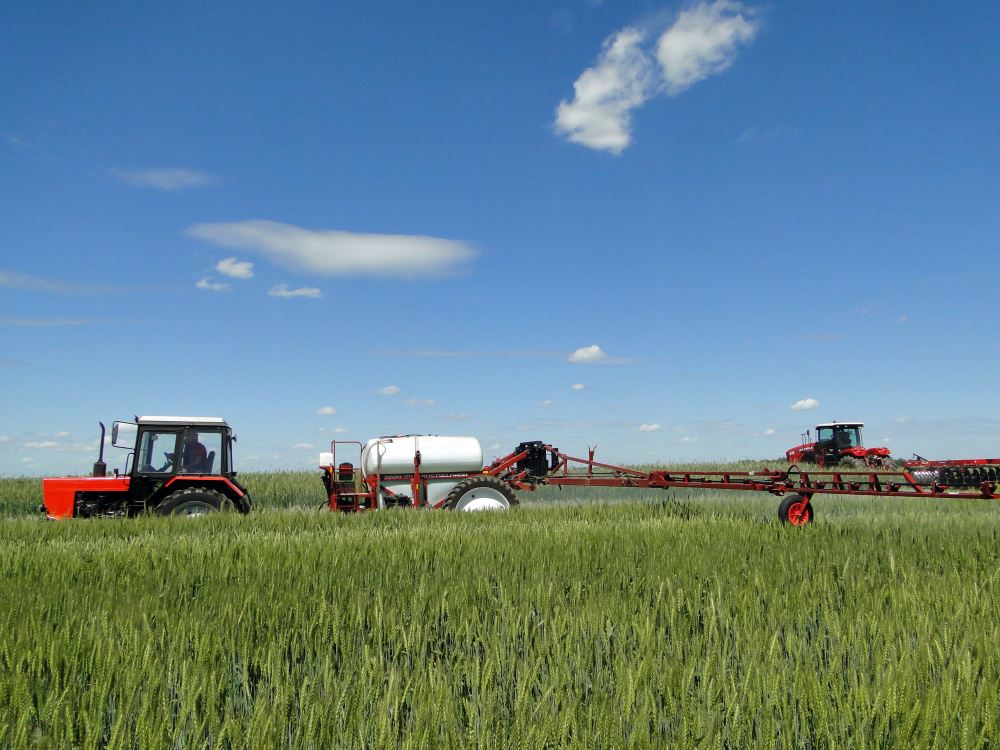 |
An innovative plant growth promoter for organic and traditional farming
|
Foliar spraying |
|

These recommendations are based on 'The list of pesticides allowed for use in Russian Federation', regulations issued by The Institute of Plant Protection Russ. Acad. Agric. Sci., and other Russian authorities. Therefore, the recommendations are applicable in Russia only, and may be partially or entirely changed in other countries, depending on requirements of local laws and regulations
Purpose. Foliar sprayings with Albit provide protection against leaf infections (powdery mildews, brown rust, Septoria and other leaf spots, etc.), improve yield quality (content of gluten in wheat grain, sugar in sugar beet, vitamins in vegetables), promotes setting of additional seeds in ear, relieve stress of pesticidal treatments, increase heat and drought resistance, activate growth of rootage, accelerate ripening.
Foliar sprayings are necessary for reinforcement and prolongation of presowing seed treatment effect on grain crops, sunflower and flax. However, foliar spraying of listed cultures is quite important on its own, and may be carried out without preliminary presowing treatment. For sugar beet, maize, millet, canola, vegetables, vine, fodder grasses, horticultures and decorative plants, the foliar sprayings are crucially important. In some cases, these cultures should be treated within vegetation period only (without presowing seed treatment). Increase of gluten content in wheat grain is mainly due to foliar sprayings.
Treatment technology. Working solution is prepared as in case of presowing seed treatment; spraying is carried out with standard rod and other sprayers, rainers, etc.; aerial application is also quite effective. Treatments are to be performed in morning and evening time, in absence of rain.
Treatment of majority of flowers, decorative cultures, horticultures and berries can be carried out through simple watering with Albit solution (1 ml/10 L, or approx. ¼ of teaspoon per 10 L bucket of water), providing moistening of leaves with Albit solution. This method is optimal for small plots. The same solution might be also used for standard watering, leaf feeding and drip irrigation, saturation of peat and soil mixes.
To obtain maximal treatment efficiency, it is often recommended to perform 2-3 foliar sprayings. For example, treatments of cereals are carried out in EC stages 20-39 and 50-79, treatment of sugar beet – in stage of 2-3 pairs of real leaves and further in dependence on application recommendations for herbicides, treatment of potato – several times starting from leaf closure in rows. Generally, the earlier treatments are the most effective ones: treatment of cereals in EC stages 20-29, treatment of maize in stage of 4-6 leaves, treatment of flax in fir-tree stage, etc. Late treatments with Albit are highly efficient only in case of sugar beet (in second half of vegetation).
The most effective way of Albit application is in combination with herbicides, insecticides, fungicides and liquid fertilizers in course of their scheduled treatments. In this case, schedule of applications is determined by application recommendations of the chemical pesticides.
In case of later application, disease-sensitive varieties and in wet years, Albit should be used in combination with chemical fungicides. In absence of epiphytotic development of disease (prevalence below 50%), Albit can be used with halved doses of fungicides, that provides saving of 20-45% expenses while efficiency remains the same. Expenses on treatment of gardens, vineyards, potato and vegetable fields can be also reduced by partial replacement of fungicidal treatments for Albit ones.
Joint application of Albit with herbicides is efficient on cereals, sugar beet, sunflower, soybean, flax and other cultures. Albit relives herbicidal stress, that provides averagely 16.6% higher yield as compared to application of pure herbicides. Herbicidal treatments make plants more sensitive to leaf infections, whereas combination of herbicides with Albit abolishes this effect and immunizes plants, that allows avoiding of the following fungicidal treatments. Also, foliar spraying with Albit within 1-5 days after herbicidal treatments effectively eliminates consequences of herbicide overdose.
It is recommended to combine Albit with insecticides against shield-backed bugs, plant louses, leaf-miner flies, Colorado beetles and other insect pests. Due to Albit antidote effect, such treatments lead to yield increase by 8-32% (in case of canola – up to 93%) over control (plants treated with insecticide only) and to increase of gluten content in wheat by 1.2-4.6%.
Albit applied as an antidote is effective in case of leaf feeding with nitrogen fertilizers (urea, ammonium nitrate) and with complex microelement fertilizers.
In practice, Albit is the most widely used for foliar spraying in mixes with herbicides.
| NOTICE: | Information contained on this page is provided according
to the Terms and Conditions located at
www.albit.com/application/disclaimer.php
|